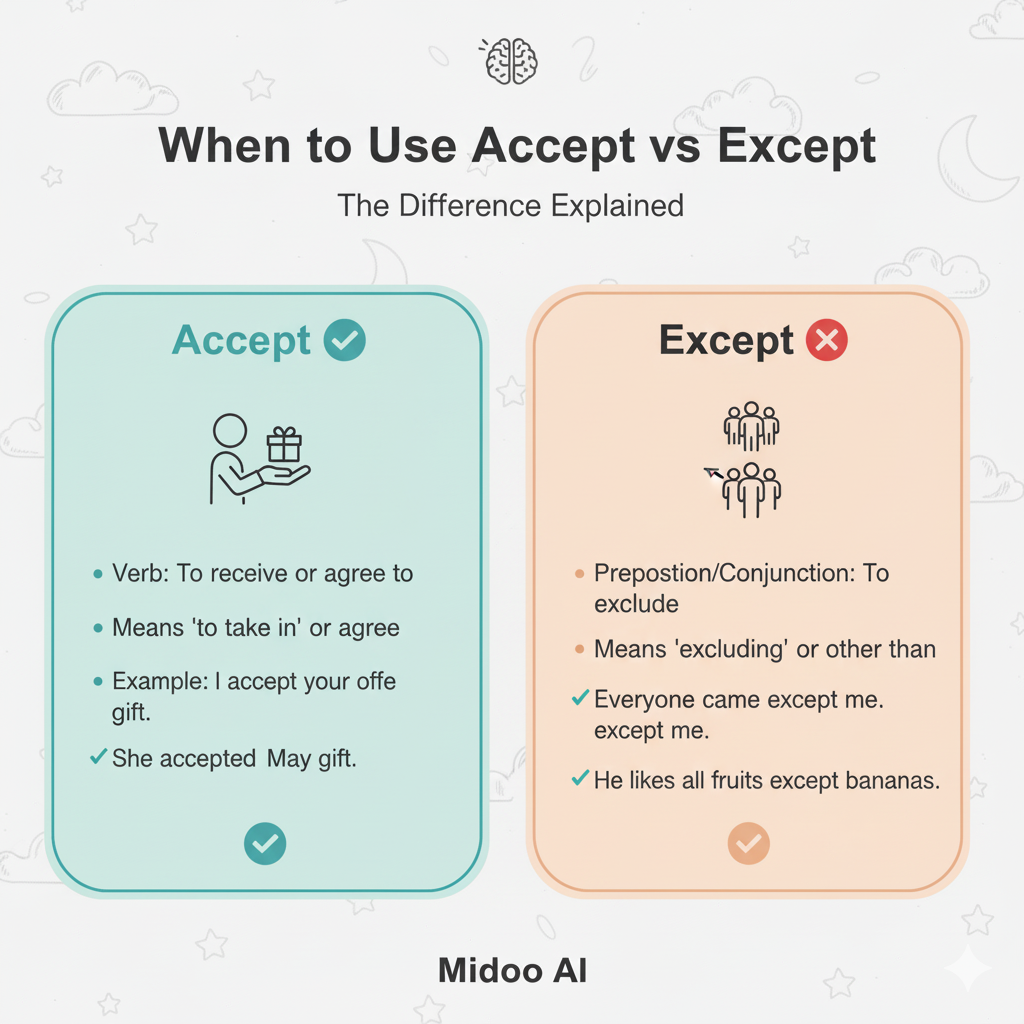Accept vs. Except—How to Use Them Correctly

English learners often struggle with pairs of words that look and sound similar but carry completely different meanings. One of the most common confusing pairs is accept and except. Both are everyday words, but using the wrong one can completely change your sentence.
At Midoo AI, we know how frustrating this can be. That’s why today, we’ll break down the difference between accept and except in a simple way, give you plenty of examples, and share quick memory tricks. Once you’ve mastered this pair, you’ll feel much more confident in your English writing and speaking.
1. The Basic Meanings
Accept (Verb)
To accept means to agree, receive, or say “yes” to something.
Examples:
- She happily accepted the job offer.
- Please accept this gift as a token of my thanks.
- He finally accepted the truth.
- The university accepted 500 new students this year.
- I accept full responsibility for the mistake.
Tip: If it’s about receiving or agreeing, use accept.
Except (Preposition/Conjunction/Verb)
Except usually means “not including” or “excluding.” It’s used to show something that is left out.
Examples (Preposition):
- Everyone came to the meeting except John.
- I like all fruits except bananas.
Examples (Conjunction):
- I would go, except I’m too tired.
- She would have helped, except she was busy.
Examples (Verb, rare and formal):
- The law excepts certain cases.
Tip: If it’s about leaving something out, use except.
2. Key Differences at a Glance
| Word | Part of Speech | Meaning | Example Sentence |
|---|---|---|---|
| Accept | Verb | Receive, agree, or approve | I accept your apology. |
| Except | Preposition/Conjunction/Verb | Exclude, leave out, or “but” | Everyone is invited except Tom. |
3. Common Mistakes to Avoid
❌ I excepted the gift from her.
✅ I accepted the gift from her.
❌ Everyone accept John was late.
✅ Everyone except John was late.
❌ Please except my apology.
✅ Please accept my apology.
Tip: If you’re talking about gifts, offers, or responsibility, think accept. If you’re talking about leaving someone or something out, think except.
4. Quick Memory Hacks
- Accept = Agree / Approve → both start with A.
- Except = Exclude → both start with Ex.
- If it’s positive or about receiving → accept.
- If it’s negative or about leaving out → except.
5. Real-Life Sentences
- The company accepted her application.
- We work every day except Sunday.
- He refused to accept defeat.
- The shop is open daily except holidays.
- They wouldn’t let him in, except as a guest.
FAQ
Q1: Can “except” ever mean “unless”?
Yes, in some contexts. For example: I won’t go, except you ask me nicely. Here, except means “unless.”
Q2: Is “accept” always formal?
Not always. Accept is common in both formal and informal situations. For example: I accept your challenge! sounds casual.
Q3: Is “except for” the same as “except”?
They’re very close. Everyone came except John and Everyone came except for John are both correct. Adding for just makes it slightly more formal.
Q4: What’s the rare verb use of “except”?
In legal or formal writing, except can mean “to exclude.” Example: The policy excepts emergency cases. But in everyday English, you’ll almost never use this.
Final Tip from Midoo AI
The difference between accept and except is simple once you practice:
- Accept is about receiving or agreeing.
- Except is about excluding or leaving out.
With these tips—and a little practice on Midoo AI—you’ll quickly learn to choose the right word every time.